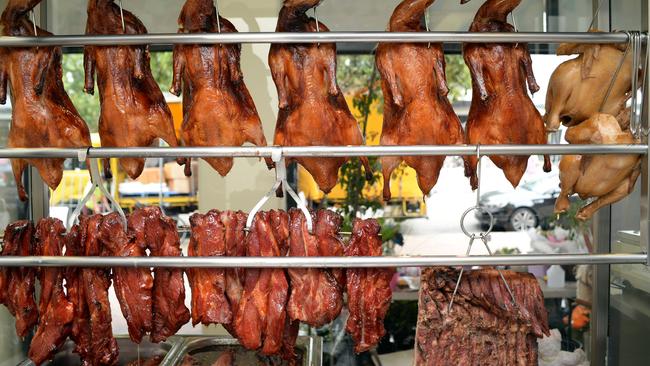If eating meat is wrong, I don’t want to be right


As a buffet diner of longstanding, I can advise the trick to this form of gluttony is a big purge beforehand. No solid matter should pass your lips for eight hours before you slide your plate along the servery. Don’t fill up on bread. Stick to the carvery. Use vegetables as garnishes and gently poke them out of the way with your fork. Eat. Repeat.
Two hours later, sit back in deep satisfaction, so much so you may want to request to be wheeled out to the car park in one of those luggage carriers hotels keep around the lobby.
But as any public health official will tell you, not only is the buffet a sin, in fact one and possibly two of the seven deadly sins — gluttony and possibly vanity if you stop to admire your belly bursting through your shirt in the mirror afterwards, but it also, maybe, probably, almost certainly, give or take a scientific study or two, creates a risk of premature death.
Don’t even get them started on barbecues.
If you eat bacon, even one rasher in the morning, you’ll be dead by sundown. Or something like that. Public health folk love to make us scared and in their condescension to the lumpen masses prefer hyperbole to fact.
For four years now the World Health Organisation in cahoots with one of its agencies, the International Agency for Cancer Research, has listed processed meats — sausages, salami, bacon, ham, the humble frankfurter et cetera etc., Group One carcinogens. Smoking cigarettes are on the same line of betting, but the grouping is fraught in terms of risk and the WHO happily admits this.
Eating bacon, even barbecuing it to a frazzle, is not the same as sucking down a pack of cigarettes, even the public health folk won’t go that far.
But the way this information is framed and expressed to the public, the inference is created that chowing down on a hot dog equals your guts falling out of all the wrong holes just prior to taking your spot up the back with the choir invisible.
For the same period, IARC has stated that red or unprocessed meat is a Group 2A carcinogen. What the WHO with a host of public health organisation following in lock step is the dumbed down term “probably” causes cancer. It’s an easy way out of explaining that the classification is based on limited evidence from epidemiological studies. What this means is a positive association has been observed between exposure to red meat and cancer, but other explanations could not be ruled out.
In this case the term “probably” isn’t useful at all. I can think of any number of qualifying terms that might be more precise but as I say, exaggeration is the stock in trade of the public health industry.
In fact, the term “probably” might just as well be swept entirely off the table if a study published in the Annals of Internal Medicine released late last month is anything to go by.
Those findings broadly reported that the research showed, “no certainty that the consumption of red or processed meats causes cancer, diabetes or heart disease.”
More specifically, the study that “among 12 randomised control trials involving about 54,000 individuals, did not find a statistically significant or an important association in the risk of heart disease, cancer or diabetes for those that consumed less red or processed meat”.
In other words, if you’ve been a massive carnivore and decide to have one of those lifestyle changes that many middle aged men and women oddly undergo, where they start pounding the pavement in their Nikes or popping the lycra on to pedal about on our streets and choose to have a salad for dinner, they remain in the same high risk categories as me after I’ve wiped the grease and animal blood from my chin after my third trip to the carvery.
What does all this mean? At very least, the jury is out on health risks associated with the consumption of red and processed meats. A quick glance at the WHO website as well as assorted public health groups in Australia like the Cancer Council shows they have either chosen to ignore the study or are too lazy to update their websites.
The IARC does solid work. Let’s not shoot the messenger. The agency’s epidemiological studies add to our body of knowledge and allow people to make informed choices on their own health. Any sensible person should support governments and their agencies providing people with the latest and best information after which they should be shooed out of the way, so people can make their choices and determine what risks they want to take.
There is an entire multi-billion dollar industry devoted to nutrition and diet. Most of it is junk, some of it dangerous. A lot of it is driven by celebrity chefs who can grill a steak but in physiological and anatomical terms wouldn’t know their arses from their elbows. With a seething mass of misinformation, scams and swindles in the marketplace on that most normal of human functions, eating, objective facts and evidence are important.
What is a problem is the public health industry has become political in its conduct and worse, behaves like the ugliest kind of politician, the one that refuses to accept that they were wrong. Thus, people make life choices based on old or outdated information or get tangled up on the guilt trips the public health industry uses as weapons.
If eating meat is wrong, I don’t want to be right. But oddly, it seems I’ve been right all along. Bon appètit, Australia. See you at the carvery.



I was at a buffet dinner at a Sydney five-star hotel earlier this week. It’s just about the best thing you can do sitting down. Or getting up and sitting down before getting up and sitting down again.